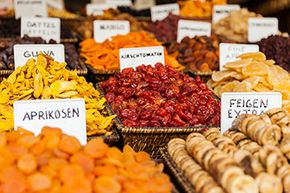The Science and Nutrition of Dehydrated Food
The concept behind food dehydration is simple: Remove moisture to make it last longer. But why does that help? To understand this phenomenon, first you need to know a little bit about why food spoils.
If you've ever let something get buried in your refrigerator, you've seen the effects of one factor: microorganisms. Bacteria, yeasts and molds love to feed on your leftovers, a process that eventually makes your food look and smell terrible. Another cause of spoilage is the food's natural enzymes. They're what cause ripening in fruits and vegetables, turning your bananas from a firm, yellow fruit to a squishy, brown one. Reducing the moisture content in food hampers both of these processes, allowing it to last up to a year when properly stored [sources: UNL, Boyer and Huff, U of M Extension].
Advertisement
Longevity does have some costs, however. See, when fruits and vegetables are dried, they lose as much as 80 and 90 percent of their moisture, respectively. That means that they're much smaller and lighter — and much easier to eat. So while you might never think of eating 20 fresh apricots in one sitting, it's very easy to do when they're dehydrated.
What's the problem with that? For one, it means more calories: One cup of fresh apricot halves is 74 calories, while one cup dried is 212. There's more fiber, too: 3.1 grams versus 6.5 grams in the apricot comparison [source: Ray]. While fiber is actually good for you in small doses, the high levels found in dried fruit could quickly lead to bowel problems like gas, bloating, cramping, constipation and even diarrhea. A final issue is the amount of fructose. This naturally occurring sugar is more concentrated in dried fruit, potentially causing tooth decay and, in some people, digestive issues [sources: Anne, Kirchheimer].
At least you'd get more vitamins, right? Not necessarily. Depending on how the food is prepared and dehydrated, losses of heat-sensitive vitamins like vitamin C and thiamin can be significant. Fruits like apples, apricots, peaches, and prunes lose about 6 percent of their vitamin A, 55 percent of thiamin, 10 percent of niacin and 56 percent of vitamin C [source: Francis]. Unfortunately, there aren't any perfect solutions to this problem. Techniques like blanching (briefly scalding food in hot water) and pretreatment with sulfites can slow the loss of some nutrients, but they also increase the loss of others [source: U of M Extension].
